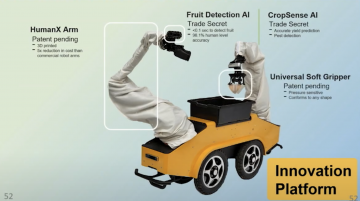 Several HATCH ventures are garnering international attention and awards, a testament to the training they receive in HATCH.
Several HATCH ventures are garnering international attention and awards, a testament to the training they receive in HATCH.
One of this year’s graduates, Neupeak, has developed compact autonomous intelligent fruit-picking robots with a seven-degrees-of-freedom robotic arm for harvesting strawberries, raspberries, blueberries and other fruit, night and day. The robot’s AI system can also analyze the state of the crop while harvesting and deliver reports to farmers, and they dutifully return to the barn for a charge when running low on power.
The promise of this technology for addressing widespread agricultural labour shortages was acknowledged at the 2021 Grow-NY Food & Agriculture Summit, where its second-place win in competition with startups from around the world secured the company $500,000 USD to further advance the business. Neupeak’s pitch at the summit provides a good snapshot of the company. Prototypes were refined following strawberry-picking testing in the Vancouver area this summer.
Takachar (aka SafiOrganics) is addressing the impacts of the mass amount of agricultural waste we generate globally every year. The company’s solution has won £1 million in the inaugural Earthshot Prize founded by Prince William and The Royal Foundation, and $1M in the Musk Foundation’s XPrize Carbon Removalcompetition. Agricultural waste is often burned by farmers in remote regions such as are found in India and Africa. This produces thick smoke that in some areas has reduced life expectancy by as much as a decade. Alternatively, farmers must shoulder the cost of hauling loose, wet, and bulky biomass to a centralized conversion facility. The company, whose co-founder and CTO Kevin Kung particpated in the HATCH CORE Venture Building Program while pursuing a postdoctoral fellowship in Chemical and Biological Engineering at UBC.
Takachar has developed a cheap, portable device that can be towed behind a tractor or transported in a pickup truck, and uses torrefaction to transform biomass into bio-products such as fuel and fertilizer. Takachar’s technology reduces smoke emissions by up to 98%, significantly improving the health of local farmers, while providing them with additional profits. This is particular valuable to smaller-scale farmers, particularly women in India, as they don’t have to pay to transport their biochar to market.
The tremendous potential of Takachar’s technology to have a major impact on the global climate was recognized last year when they won £1 million in the inaugural Earthshot Prize founded by Prince William and The Royal Foundation. It is the world’s most prestigious environmental prize, and was Inspired by President Kennedy’s Moonshot challenge. Takachar won in the Clean Our Air category.
The prize money has allowed Takachar to double their staff and speed up their prototyping process and double the size of their team. They were also awarded a $1M student prize in the Musk Foundation’s XPrize Carbon Removal competition. Co-founder and CEO Vidyut Mohan had the chance to share more on his work and journey with Earthshot Prize Council Member Cate Blanchett on her “Climate of Change” podcast, and has has private meetings with both Prime Minister Narendra Modi of India, and Mike Bloomberg.